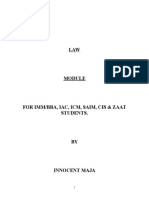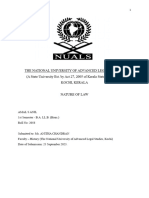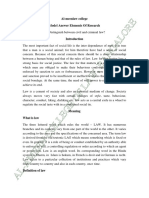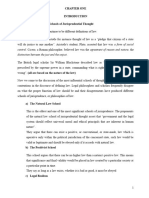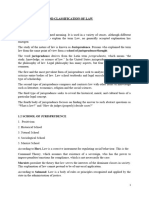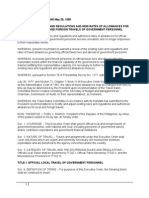POL 105 – NIGERIAN LEGAL SYSTEM
COURSE CONTENTS
1. Nature of Legal System
2. Nature of Law
3. Meaning of Law
4. Differences between Law, Morality and Customs
5. Usefulness of Law
6. Classification of Law
7. Sources of Nigerian Law
8. Hierarchy of Courts
9. Rules of Interpretation of Statutes
1
�Nature of Legal System
Every society all over the world has set of laws, rules and regulations and a system
of enforcement put in place to regulate and protect persons and properties in the
overall interest of the society. While a person desires absolute freedom to do or not
to do whatever he likes, the state has had to limit absolute freedom in the overall
interest of the society in general. Hence, human conduct is regulated by law,
prescribing standards of behaviour in the society. Therefore, where law guarantees
a right, there is a corresponding duty created. Similarly, whenever law imposes a
duty, it also creates corresponding right. Without law and a law enforcement
system, society would be disorderly. Rights and duties would be meaningless.
They would not be respected and protected. Orderly and right living would be
impossible. There would be chaos and anarchy. Therefore, the existence of a legal
system is a necessity in the overall interest of the society in general.
The term ‘legal system’ is the composition of the laws, courts, personnel of the law
and the administration of justice system in a given state, country or geographical
entity. Therefore, the study of Nigerian Legal System is the study of the laws,
courts, personnel of the law and the administration of justice system in Nigeria.
Nature of Law
Every society whether primitive or civilized, is governed by a body of rules which
the members of the society regard as the standard of behaviour. It is only when
2
�rules involve the idea of obligation that they become law. When they merely
represent the notions of good and bad behaviour, they are rules of morality.
Nevertheless, law is most effective when it conforms to the moral feelings of the
members of the community. Mere coincidence of patterns of behaviour does not
indicate the existence of law. Mere habits are thus to be distinguished from
obligatory rules.
Meaning of Law
Law is a complex phenomenon. There is no universally accepted definition of law.
Law may however be seen as consisting of body of rules of human conduct. It is
the rules and regulations of a given society. It is the rules usually made by the
legislative arm of government which order the way persons, bodies and society
should behave. It is the code of conduct for persons, bodies and society in general.
Differences between Law, Morality and Customs
Law and morality may appear to mean the same thing, but the two are mutually
independent, though they may appear to be in harmony in some instances. In some
cases, the law appears to be behind morality; while the reverse is the case in others.
For example, while adultery is a moral wrong in the southern states of Nigeria, it is
not an offence under the law. This shows that the level of moral condemnation is
not strong enough to make it an offence. Likewise, except in exceptional
circumstances where exists special relationship, a person is not obliged under the
3
�law to come to the aid of his neighbour in putting out a blazing fire that eventually
engulfs his property even if it is shown that it could have been done without risk of
injury to his person. Therefore, the difference between law and morality is the
availability of sanction. Law, unlike morality, almost always provides for definite
sanctions; while the breach of a moral code may only incur societal disapproval or
spiritual condemnation.
Customs like law also have normative values and command obedience from
members of the society. But in spite of their effectiveness, they are easily
distinguishable from law in the sense that unlike customs, law attracts physical
coercion. A custom does not become legally binding unless it receives the force of
law.
Usefulness of Law
Law is very useful in every society. Some of the usefulness of law among others
are that:
1. It assures orderliness and peace in society
2. It guarantees of rights, freedoms and duties
3. It assures safety of life, property and society
4. It provides a forum for peaceful and orderly resolution of disputes i.e courts
5. It assures progress and advancement of society
4
� 6. It provides a framework for individual self-actualisation and achievement of
societal goals.
7. It ensures an orderly, safe, progressive and free society.
Classification of Law
There is no universally accepted authoritative way of classifying law; and some
laws may be overlapping i.e falling into different classes. However, all laws may
be generally classified into pairs as follows:
1. Public Law and Private Law
2. Criminal Law and Civil Law
3. Substantive Law and Procedural (Adjectival) Law
4. International Law and Municipal Law
5. Written Law and Unwritten Law
6. English Law and Customary Law and Islamic Law
7. Common Law and Equity
8. Primary Law and Secondary Law
Public Law and Private Law
Public law is primarily concerned with the smooth running of the machinery of
state. Therefore, it caters for cases where interest of society is directly involved or
the smooth interaction between governmental agencies and organ of the state is
5
�threatened. Subjects like constitutional law, administrative law, criminal law,
revenue law etc fall within the purview of public law.
Private law on the other hand, is the branch of law which is concerned with the
legal relationships of private individuals, association of persons and corporate
bodies and their rights and duties. Examples of private law are law of contract, law
of torts, family law, succession and commercial law.
Criminal Law and Civil Law
Criminal law is the law which defines, prohibits and punishes crime. It involves the
enforcement of those rules of conduct, the infringement of which will invoke a
punishment. Criminal prosecution is the responsibility of the state, although private
prosecutions are allowed in well-defined circumstances.
Civil law is primarily concerned with competing private interests and obligations.
It is often invoked by private persons, although the state or its organs may, in
appropriate cases, initiate or defend such actions. The object of a civil action is to
obtain relief either by way of damages or injunction.
Substantive Law and Procedural/Adjectival Law
Substantive law is the law which stipulates rights and duties. It is the actual law, or
law as we know it. It is the law which creates, defines and regulates the rights and
duties of persons. It is the law which stipulates what conduct is lawful or unlawful;
permissible or prohibited.
6
�Procedural/Adjectival law on the other hand, is the law of the process and
procedure of enforcing substantive law. It is the law which stipulates the process
and how to enforce substantive law. It is the rules of practice and procedure. It is
the rules which regulate the application, administration and enforcement of
substantive law. It stipulates the process and methods of proof and how to obtain
and enforce remedies for the breach of substantive law.
International Law and Municipal Law
International law is the law which regulates legal relations among sovereign
nations. It is the rules and agreements which regulate the conduct of nations and
international organisations.
Municipal law is the laws of a given country being laws made by such country for
itself. It is the laws emanating from a particular country and having the force of
law within its territory.
Written Law and Unwritten Law
Written law is commonly known as statute law or legislation. Written law is law
which takes its force from express legislative enactment.
Unwritten law is all parts of the law, observed by the people and administered in
the courts, but which has not been passed in the form of statute law.
7
�English Law, Customary Law and Islamic Law
English law is the law of England which was received into Nigeria by virtue of
local statutes which permitted the application of English law in Nigeria. The
English law which was received for application in Nigeria is made up of three
different kinds of laws – the Common Law of England, Equity and Statutes of
general application in force in England on January 1, 1900.
Customary law is a custom which is accepted as binding by a people. It is the body
of customs which from long use have acquired the force of law among a people.
Islamic law is principally in written form. The sources of Islamic law are the Holy
Qur’an, the practice of the Prophet (SAW) i.e Sunnah, the consensus of scholars
and analogical deductions from the Holy Qur’an and from the practice of the
Prophet (SAW). Islamic law is alternatively called Shari’ah (the sacred law of
Islam).
Common Law and Equity
Common law is the law which grew from the customs common to the people of
England and Wales. It is that part of the laws of England which grew from the
common customs of the people and was applied as judicial precedents i.e
successive like decisions of the courts through the ages.
8
�Equity is the rules of fairness and natural justice, formulated and administered by
the Court of Chancery to supplement and soften the hardships of the Common Law
of England.
Primary Law and Secondary/Subsidiary Law
Primary law means law actually made by parliament or the legislature.
Secondary/subsidiary law means delegated legislation made by public officer,
administrative authority, statutory body, government department or public agency
pursuant to a primary law which has delegated authority or power to the public
authority to make such delegated legislation.
Sources of Nigerian Law
Sources of Nigerian law are:
1. Nigerian legislation which consists of Ordinances passed by Nigerian
Central Legislature before October 1, 1954; Acts of National Assembly;
Laws of States Assemblies; Decrees of Federal Military Government; Edicts
of States Military Governments; and Local Government Bye-Laws.
2. English Law which consists of:
a) Received English Law comprising:
i. Common Law;
ii. Doctrines of Equity;
iii. Statutes of general application in force in England on January 1, 1900;
9
� iv. Statutes and subsidiary legislation on specified matters
b) English law made before October 1, 1960 and extending to Nigeria.
3. Islamic Law which consists of Qur’an, Hadith and Sunnah of the Prophet
Muhammad (SAW); Ijma (Consensus of the Jurists); Qiyas (Analogical
deductions based on the provisions of the Qur’an, Hadith and Sunnah).
4. Customary Law or native law and custom is a custom which is accepted as
binding by a people. It is that customs that have the force of law among a
given people. It is a body of customs which from long use has acquired the
force of law among a people. The attributes of customary law are that:
a) It must be in existence at the material time;
b) It must enjoy general application among the people;
c) It must be accepted as a binding custom;
d) It is flexible or elastic; and
e) It is largely unwritten.
For a custom to be applied as a customary law and enforceable by the courts in
today Nigerian society, the custom must satisfy or pass three validity tests which
are:
a) The repugnancy test which requires that a custom should not be contrary to
natural justice, equity and good conscience.
10
� i. Natural justice which means fair hearing in all ramifications. It is an
inherent right of a person to have fair and just treatment by others.
Natural justice has two main principles in Latin phrases as:
Audi altarem partem which means hear both parties in a dispute before
giving judgement or taking decision; and
Nemo judex in causa sua which means that no one should be a judge in his
own cause.
b) Equity means fairness, just, right and justice.
c) Good conscience means a conscience that is innocent, pure and impartial. It
is a good heart and mind that will not do wrong to another person. It is a
conscience that is good and just towards everyone and the world as a whole.
Likewise, for a custom to be applied as a customary law and enforceable by the
courts in today Nigerian society, the custom must satisfy or pass the
incompatibility test as well as public policy test.
5. Judicial precedents or case law consists of law found in judicial decisions. It
is the principle of law on which a judicial decision is based. It is the ratio
decidendi (reason for the decision). It follows that it is not everything said
by a judge in the course of delivering his judgement that constitutes a
precedent. Only the pronouncement on law in relation to the material facts
before the judge constitutes a precedent. Any other pronouncement on law
11
� made in the course of a judgement is an obiter dictum (statement by the
way); and it does not form part of the ratio decidendi. Unlike ratio decidendi,
obiter dictum has no binding effect for the purpose of the doctrine of judicial
precedent. Following the principle of case law or judicial precedent, the
doctrine of stare decisis (binding precedent) makes it a rule that a court is
bound to follow decisions of a higher court in the hierarchy. But a lower
court is not bound to follow a decision of a higher court which has been
overruled. Furthermore, a lower court is not bound by a decision of a higher
court where that decision is in conflict with a decision of another court
which is above such higher court in hierarchy. Moreover, in principle, a
lower court is entitled to choose which of two conflicting decisions of a
higher court or higher courts of coordinate jurisdiction. Therefore, precedent
is either binding or persuasive. It is binding when the court in which it is
being advanced is bound to follow it. Decisions of courts higher in the
judicial hierarchy are normally binding on the lower courts. On the other
hand, precedent is persuasive when it is within the powers of the lower court
to either choose to follow or depart from it. Decisions of lower courts, courts
of coordinate jurisdiction and foreign courts are treated as merely persuasive.
Hierarchy of Courts
12
�It is well known that the courts in Nigeria exercise the powers of the judicial arm
of the government. Section 6 (1) and (2) of the 1999 Constitution of the Federal
Republic of Nigeria vest the judicial powers of the Federation and states in the
respective courts listed in subsection (5) of section 6 of the Constitution. These
courts are:
The Supreme Court of Nigeria
The Court of Appeal
The Federal High Court
The High Court of the FCT, Abuja
High Court of states
The Shariah Court of Appeal of the FCT, Abuja
Shariah Court of Appeal of states
The Customary Court of Appeal of the FCT, Abuja
Customary Court of Appeal of states
Such other courts as may be authorised by law to exercise jurisdiction on
matters with respect to which the National Assembly or a House of
Assembly may make laws
Apart from the courts specifically listed above, subsection (4) (a) of section 6
further empowers the National Assembly and states Houses of Assembly to
establish courts with subordinate jurisdiction to that of a High Court. It is in line
13
�with this, that courts like Area Courts, Lower and Upper Shariah Courts,
Customary Courts of different grades, and Magistrates’ Courts of different grades
are established in different states. Furthermore, mobile courts and other kinds of
courts are established for effective administration of justice in any state that wishes
to so establish.
Jurisdiction of court is generally described as the legal authority or the extent of
the power given to a court by the law establishing it. Such powers may be limited
or unlimited. The limitation may be in reference to geographical area; in respect of
the amount over which the court may not exceed; in regard to the kind of matters
that it can lawfully determine; or as to the value of the property in litigation. Where
the jurisdiction of a court is thus limited, the court is referred to as a “court of
limited jurisdiction”. If there is no such limitation, then the court is referred to as a
“court of unlimited jurisdiction”.
Courts may further be classified into superior courts and inferior courts. Section 6
(3) designates the courts specifically mentioned in subsection (5) as the only
superior courts of record in Nigeria. Others are classified as inferior courts.
Appeals from inferior courts lie in the superior courts. For instance, appeal from
Magistrate/District Court lie in the High Court of the respective state. Likewise,
appeal from Area/Shariah Courts lie in the Shariah Court of Appeal of the
respective state. Appeal from Customary Court lie in the Customary Court of
14
�Appeal of the respective state. Further, appeals from High Court, Shariah Court of
Appeal and Customary Court of Appeal of any state lie in the Court of Appeal.
Furthermore, all appeals from any court with coordinate jurisdiction with the High
Court, such as Federal High Court, Code of Conduct Tribunal, Court Martial,
Industrial Court, Revenue Court, Election Tribunal etc, lie in the Court of Appeal.
Finally, appeal from Court of Appeal lie in the Supreme Court of Nigeria which is
the apex court in Nigeria, and no more appeal.
Supreme Court
Federal High Court; Court of Appeal Election Tribunal; Court Martial;
Industrial Court; Code of Conduct Tribunal;
Revenue Court
State High Court Shariah Court of Appeal Customary Court of Appeal
Magistrate Court Upper Area/Shariah Court Customary Court
Lower Area/Shariah Court
Rules of Interpretation of Statutes
The judiciary is one of the three arms of government saddled with the duty of
interpretation of laws and adjudicating on matters brought before courts. Where a
statute as enacted by the legislature is clear, plain or free from ambiguity, the need
15
�for interpretation of the statute will not arise. In such instance, the court will
straight away apply the law as it is. Laws are generally written in words. Words are
not always exact in meaning. A word may not have one meaning, but several
meanings. The intention of the legislature as expressed in a statute is not always
clear and free from ambiguity. In such instance, a judge must decide the meaning
of the word, clause or provision in issue. Therefore, it is one thing for the
legislature to enact a statute, and another thing for the courts to be able to apply the
provisions of the statute to the cases which come before the courts.
The main principles or rules of interpretation evolved over time by judges to find
out the meaning of a statute or intention of a lawmaker as written down in a statute
are: literal rule, golden rule and mischief rule.
1. The Literal Rule
By literal rule, a statute is to be interpreted according to the ordinary, natural,
literal and grammatical meaning of the words of the statute. The literal rule is
usually applied first. It is where the literal rule will not achieve the purpose of a
statute that other rules of interpretation are applied. Under this rule, where there is
any inadequacy in a law, it is for parliament and not for the judiciary to decide
whether any changes should be made to the law. It is the duty of parliament to
amend a law to keep pace with the needs of the society.
2. Golden Rule
16
�The golden rule means that where the literal meaning of words will lead to an
absurd result, a court should adopt an interpretation that avoids the absurdity. Thus,
where for instance, a provision is capable of more than one meaning, the golden
rule enables a judge to adopt a meaning which will avoid absurdity. In other words,
where a study of the statute as a whole reveals that the decision, ruling, judgement,
order or conclusion that will be reached by applying the literal rule is contrary to
the intention of parliament, the golden rule enables court to adopt an interpretation
that will avoid absurdity and promote the intention of parliament or law and order
and a peaceful society.
3. Mischief Rule
The mischief rule means that a statute should be interpreted to deal with the
mischief it was enacted to cure. The mischief rule requires that a judge should look
at a statute to see the intention of parliament and interpret it to remedy the wrongs
that it was meant to correct. Under this rule, a court will examine a statute to see
what is its intention or purpose and what mischief, wrong, evil, problem or
weakness in the former law or society that the statute was enacted or intended to
cure, and then interpret it to prevent the mischief.
Apart from the main rules of interpretation of statutes, other rules which have been
evolved by judges to help in the interpretation of statutes are that: a statute must be
read as a whole; ejusden generis rule; and noscitur a sociis.
17
� 1. A Statute must be Read as a Whole
A statute must be read as a whole in order to find out and understand parliament’s
intentions as expressed in the statute. The words, clauses and provisions of a
statute must not be picked and read in isolation from the whole statute. This is so
because when a statute is read as a whole, other provisions which throw more light,
explain, limit, enhance or are complementary to the provision sought to be applied
may be found. All these help to apply a statute to remedy the problem it was
enacted to correct.
2. Ejusdem Generis Rule
Ejusdem generis is a Latin phrase which means “of the same kind or nature”.
Ejusdem generis is a rule of interpretation which states that where particular words
are followed by general words, the general words are to be interpreted as being
limited or restricted to the same kind as the particular words. However, there must
first be a category specified before the presumption can apply. Thus, where a
statute for instance refers to “dogs, goats, cats and other animals”, the phrase “and
other animals” are to be interpreted or construed as limited in their application or
reference to domestic animals. The phrase would not be stretched or interpreted to
include animals which are not domestic in nature.
3. Noscitur a Sociis or the Context Rule
18
�Noscitur a sociis is a Latin maxim or phrase which means that the meaning of a
word can be gathered from its context. Just as a person may be known by the
company or the kind of friends the person keeps, so also a word may be interpreted
or known by the company of words it keeps. Thus, words are to be read and
interpreted in the context in which they have been used. Therefore, any section or
provision which is being interpreted should be read as a whole. Where a particular
provision is not clear, all relevant provisions must be considered.
19










